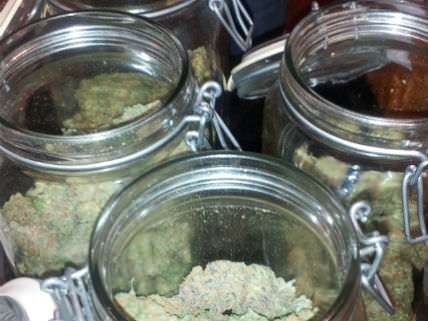When Will Legal Pot Be Available in Alaska, Oregon, and D.C.?

Although voters in Alaska, Oregon, and Washingtion, D.C., approved marijuana legalization on Tuesday, that does not mean Colorado-style pot shops will be popping up in those jurisdictions anytime soon. Here is what has to happen first:
Alaska
Measure 2 takes effect 90 days after the election results are certified, which according to the Alaska Dispatch News is expected to happen in "late November." Sometime in February, then, the provisions related to possession (up to an ounce), home cultivation (six plants, three mature), and transfers (up to an ounce, "without remuneration") will kick in. Thanks to a 1975 Alaska Supreme Court ruling, it is already legal to possess small amounts of marijuana in the privacy of one's home. Measure 2 expands that right to other settings while explicitly protecting the right to grow your own pot and share it with others.
Under Measure 2, Alaska's Alcoholic Beverage Control Board (or a special Marijuana Control Board if the state legislature decides to create one) is required to adopt regulations for commercial production and distribution of marijuana "not later than nine months after the effective date of this act," which will be about a year from now. The board is required to start "accepting and processing applications" from would-be growers, manufacturers, and merchants within three months of adopting regulations, and it is supposed to act on each application within three months. That means the first "registration" for a marijuana business might not be issued until May 2016. Allowing time for growing, harvesting, and processing, marijuana could be available to sell in state-registered stores by the end of 2016.
Oregon
Under Measure 91, adults 21 or older will be allowed to possess up to an ounce of marijuana in public, grow up to four plants at home, possess up to eight ounces at home, and share up to an ounce at a time with adults "for noncommercial purposes." Those provisions take effect on July 1, 2015. The Oregon Liquor Control Commission is required to adopt regulations for cannabusinesses by January 1, 2016, and start accepting license applications by January 4. There is no specific time limit on processing applications, but the initiative says "the commission shall not unreasonably delay" action. Assuming it takes 90 days (the upper limit in Alaska), the first marijuana businesses could be licensed in April 2016, so legal recreational sales could begin in the fall of 2016. If regulators move faster on applications, stores could open as early as that summer.
Washington, D.C.
Initiative 71 does not take effect until after D.C. Council Chairman Phil Mendelson submits it to Congress for review. For most legislation, the review period is 30 days, which is what the initiative itself indicates. For legislation that changes Title 22, 23, or 24 of the D.C. Code, the review period is 60 days. The initiative does refer to Title 22, but only to say that the fines listed there "shall be adjusted through implementing or amending legislation enacted by the Council of the District of Columbia to the extent necessary to ensure that this Act does not negate or limit any act of the Council." The D.C. Cannabis Campaign, which sponsored the initiative, says that does not amount to the sort of change that would trigger the 60-day review period. Either way, if Congress does not pass a joint resolution overturning Initiative 71 by the end of the review period, the measure takes effect.
At that point adults 21 or older would be allowed to possess up to two ounces, grow up to six plants (with no more than three mature at any given time), keep whatever marijuana those plants produce at home, and transfer up to an ounce at a time to other adults "without remuneration." Exactly when those provisions take effect depends on when Mendelson officially transmits the initiative to Congress. Nikolas Schiller, director of communications for the D.C. Cannabis Campaign, says Mendelson told the initiative's backers he plans to treat it like any other piece of legislation. But at a press conference on Wednesday, incoming Mayor Muriel Bowser said she does not want Congress to consider the initiative until the D.C. Council has approved legislation dealing with commercial production and distribution, which the initiative does not address.
If Mendelson follows Bowser's suggestion, Schiller says, implementation of Initiative 71 would be delayed at least until the middle of next year, and marijuana from licensed stores would not be available until late 2016 or early 2017. The campaign argues that the D.C. Council should respect the wishes of the voters who overwhelmingly approved the initiative by letting it take effect without delay. If the initiative goes to Congress this year, D.C. residents could be harvesting homegrown marijuana by the middle of next year instead of waiting for government-licensed stores that might not open for another year or two.
Even if Congress does not pass a joint resolution rejecting Initiative 71 or whatever bill the D.C. Council ends up passing, it can block legalization by barring the District from spending money to implement it. For years Congress used that technique to prevent implementation of the medical marijuana initiative that D.C. voters approved in 1998. Rep. Andy Harris (R-Md.), who unsuccessfully tried to stop D.C. from decriminalizing possession of marijuana this year, says he will "consider using all resources available to a member of Congress" to block legalization.
By contrast, Sen. Rand Paul (R-Ky.), who starting next year is expected to chair a Senate committee that oversees the District of Columbia, has said Congress should not override the will of D.C. voters. "I think there should be a certain amount of discretion for both states and territories and the District," Paul told reporters on Election Day. "I'm not for having the federal government get involved. I really haven't taken a stand on…the actual legalization…but I'm against the federal government telling them they can't."
